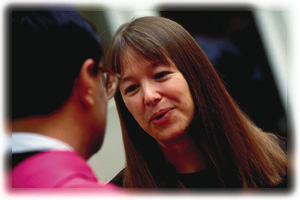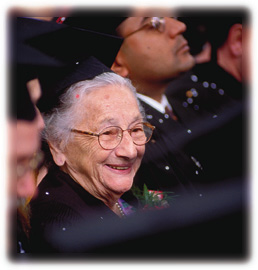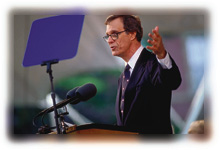![]()
Main Menu ·
Search ·
Current Issue · Contact · Archives · Centennial · Letters to the Editor · FAQs
![]()
Main Menu ·
Search ·
Current Issue · Contact · Archives · Centennial · Letters to the Editor · FAQs

 Orator Anne Fadiman '74 critiqued the "Culture Wars."
Orator Anne Fadiman '74 critiqued the "Culture Wars." |
What do you do when a work's language leaves you out? That is, if the very words exclude you, let's say because they are addressed to men and you don't happen to be one, should you stick out your tongue and say, "Well, if that's the way you feel about it, I reject you, too"?
To answer this question, I will take as my text another Phi Beta Kappa oration, in fact the greatest one of all time. It was called "The American Scholar," and it seems appropriate to mention it today, because this year's literary exercises mark its one-hundred-and-sixtieth anniversary.
The year was 1837. The speaker was Ralph Waldo Emerson. The audience included James Russell Lowell, Oliver Wendell Holmes, Edward Everett Hale, and plenty of famous people who had only two names. Emerson orated for an hour and a quarter. "Our day of dependence, our long apprenticeship to the learning of other lands, draws to a close," he said. "The millions that around us are rushing into life, cannot always be fed on the sere remains of foreign harvest." By this he meant that American intellectuals should emancipate themselves from the European tradition and establish one of their own.
Some members of the audience were not impressed. Edward Everett Hale went home and wrote in his diary that Emerson was "half-crazy" and that his speech was "not very good, and very transcendental." But Oliver Wendell Holmes, though not immediately, called "The American Scholar" "our intellectual declaration of independence." And when Thomas Carlyle was sent a copy, he wrote to Emerson, "I could have wept to read that speech, the clear high melody of it went tingling thro' my heart;... My brave Emerson!"
The day I found I had been chosen as editor of The American Scholar, a magazine that takes its name from that very speech, I ran to my bookcase, took down a volume of my brave Emerson, and opened it to his Phi Beta Kappa oration. I expected, like Carlyle, to hear a clear high melody tingling through my heart. Instead, I read the following sentence: "In the right state, [the scholar] is Man Thinking." And my heart sank.
What Emerson meant was that his ideal American Scholar was not an academic but a thinker, a student of life. What I wondered was, when he said "Man Thinking," did he really mean, "Man and Woman Thinking"? In other words, was "Man" one of those capacious linguistic tents that once had room in it for everybody? The way "mankind" was supposed to include "womankind"?
In a word, no. Emerson was perfectly clear about it. We know this because later in his speech he specifically distinguished the scholar from "the protected classes of women and children." Every word in his oration was about men.
So even though Emerson supported women's suffrage and hung out with Margaret Fuller and Harriet Martineau and didn't complain when his wife served leg of lamb 20 days in a row, am I nonetheless forced to write him off as a wicked misogynist and cast from my bookshelf the very speech that gave my magazine its name? No.
If I leave the speech on my shelf, does that mean I am forever excluded from the Emersonian fellowship, forced to press my nose against the glass of American intellectual life, as if the Man Thinking Club were some beer-swilling fraternity that invited me on the premises only on Saturday night? No.
One of the convenient things about literature is that, despite copyright laws, a book belongs to the reader as well as to the writer. The greater the work, the wider the ownership. I therefore have few compunctions about dragging Emerson kicking and screaming into the 1990s, and recasting "Man Thinking" in my mind as "Curious People Thinking."
I will not ask the sage of Concord to rewrite his great oration. He will forever retain the right to speak his own words. But I will retain the right to crash the party. You come, too.
Harvard granted 6,102 degrees on June 5. No recipient had shown greater determination than Mary Fasano, A.A.E. '93, when she was closing in on her bachelor of liberal arts in extension studies degree. President Rudenstine saluted her during the morning exercises, "the eldest student in the history of this University to graduate with a B.A.," and noted that she took one course per semester for 17 years to realize her dream. She addressed an Extension School gathering on Thursday afternoon, in part as follows.
 Mary Fasano, imminent A.L.B., was "one of the wisest people" at Commencement.
Mary Fasano, imminent A.L.B., was "one of the wisest people" at Commencement. |
That night my daughter checked the bus station, drove around the streets, and contacted some friends. But she couldn't find me--until she called my astronomy professor, who told her that I was on top of the Science Center using the telescope to gaze at the stars. Unaware of the time, I had gotten lost in the heavens and was thinking only about the new things I had learned that night in class.
This story illustrates a habit I have developed over the years: I lose track of time when it comes to learning. How else do you explain a woman who began high school at age 71 and who is graduating with a bachelor's degree at 89? I may have started late, but I will continue to learn as long as I am able because there is no greater feeling, in my opinion, than traveling to a faraway country, as I have, and being able to identify by sight the painting of a famous artist, the statue of an obscure sculptor, the cathedral of an ancient architect. I have found that the world is a final exam that you can never be prepared enough for.
If the saying is true that wisdom comes with age, you may safely assume that I am one of the wisest people in this hall and possibly at this University today. So listen to me when I tell you this: Knowledge is power.
My studies were interrupted when I was in the seventh grade, back sometime around World War I. I loved school but was forced to leave it to care for my family. I was consigned to work in a Rhode Island cotton mill, where I labored for many years. I eventually married and raised 5 children, 20 grandchildren, and 18 great-grandchildren. But all the while I felt inferior to those around me. I knew I was as smart as a college graduate. I knew I was capable of doing a job well--I had proven it by running a successful family business for decades. But I wanted to feel confident when I spoke and I wanted people to respect my opinions.
I am here today to prove that it can be done; that the power gained by understanding and appreciating the world around us can be obtained by anyone. That belief is what has motivated me for the last 75 years to get this degree.
There are many students here who do not have the opportunity that I do to speak their minds and have everybody listen, whether they want to or not. But be assured, fellow graduates, that we are more similar than you might think. If you have treated education as your main goal, and not as a means to an end, then you, too, have probably been claimed as a missing person once in your academic career, whether you were lost in the stars or the stacks of Widener Library.
And you, too, know that the journey was worth it, and that the power of knowledge makes me the most formidable 89-year-old woman at the bus stop.
In keeping with this Commencement's international theme, President Neil L. Rudenstine's afternoon address focused on Harvard's global educational opportunities in a post-Cold War world transformed by economic, political, and technological change. Excerpts appear here; the full address may be found on the magazine's website.
 Rudenstine outlined an international agenda.
Rudenstine outlined an international agenda. |
First, we have an unprecedented opportunity to consult research materials that are far more accessible to us than ever before. These materials will help us to understand major episodes in the history of societies that have long been closed. Students and scholars also have a much greater opportunity to interview ordinary people, as well as officials, in these societies, in the search to discover and interpret the past in greater depth, and to understand the present more clearly.
We now know, for instance, that before the collapse of the Soviet Union, we continued to operate on the assumption that it remained a powerful, essentially monolithic rival empire--when, in fact, it was on a path toward disintegration. We may not be able to say precisely what we would have done if we had known the reality of that situation in 1970, or 1980, or later; but at the very least, we would have begun planning in a more informed way for the dramatically different situation in which we now find ourselves.
So we must do all we can to understand the realities of the current world, and to do that we will have to invest much more substantially in research abroad, and in curricular change at home. Our nation has not made such a concentrated investment for many years. But then we--our universities and all of us who care deeply about education--must do so, because we simply cannot risk moving ahead in ignorance.
Next, we need to create stronger connections among our various fields of international study--across disciplines and across different parts of the University. We need to create more opportunities to bring together faculty and students from a wide range of academic fields, so that they can address subjects or problems that demand different perspectives if we want to understand them as a whole.
For instance, we know a modest amount about the causes of ethnic and racial strife in certain areas of the world. However, there is a great need for studies that compare the structural elements and historical circumstances that emerge when we look carefully across a range of examples. Why do some ethnic and racial groups manage to live together with a greater degree of harmony than others? Are there general patterns that might guide us toward a broader understanding of ethnic and racial strife, so that we can build a more promising basis for addressing situations of this kind?
To undertake such studies, we need people who know the relevant languages and cultures; we need historians, ethnographers, and anthropologists; we need students of sociology and politics. In so many different areas--environmental protection, or the spread of deadly infectious diseases, or the implications of an increasingly global economy, or the effects on society of the media and of modern information networks--we will make serious progress only if we are willing to adopt an international and interdisciplinary perspective.
Third, we must expand the opportunities for international exchange, bringing together faculty and students from different nations on our own campus, as well as affording more opportunity for our own students to travel, study, or work (primarily as interns) abroad. Nothing can replace the kind of learning that happens when individuals are able to have direct contact, for a considerable period of time, with people from different cultures and backgrounds.
That is how genuine discussion and debate about international issues often start--how friendships, professional relationships, and other forms of mutual understanding can be created. That is how new insights, knowledge, and important human values are conveyed and shared. And when this process continues, we increase immeasurably the prospects for building on those relationships over decades--and for bridging the inevitable gaps that so often arise in international affairs.
The final point I want to make relates to the present state of higher education and research around the globe, and the unusual position that our American system of higher education now occupies.
Around the world, dozens of nations are in an uncertain state of rapid transition--politically, economically, and in other ways. Many of these nations simply do not have the resources to create major systems of higher education.
Far too many countries have much too small a supply of well-trained people to help develop stable, sound institutions--whether in health care or government, business or law, education or environmental planning. Harvard and other American universities have the capacity to offer this assistance, especially through mid-career and executive-education programs. Even now, thousands of individuals (from more than 100 countries) flow through our programs from year to year. We learn an extraordinary amount from the many visitors who come to our campus from abroad; and we in turn are able to make a substantial contribution to the individuals and to the societies to which they return.
The world situation we face today differs greatly from the one that followed World War II. The long-term needs lie not only in the realm of tangible goods, but at least equally in the realm of knowledge.
So, if there is a Marshall Plan for today or tomorrow, it must include the effort to create greater human capital--and deeper forms of mutual understanding--through education, research, and the training of advanced practitioners.
When Winston Churchill made a secret visit to Harvard in 1944, he was awarded an honorary degree in an extraordinary, historic ceremony. He also gave an address in Sanders Theatre, and said at one point, "The empires of the future will be empires of the mind."
Now, half a century later, that future has arrived. Empires of the mind are precisely what we are now creating. Let us do our utmost to ensure that they are humane empires, characterized by openness, inquiry, learning, and real-world effectiveness: empires dedicated to the freedom and prosperity of all people, everywhere.
Main Menu ·
Search · Current Issue · Contact · Archives · Centennial · Letters to the Editor · FAQs
![]()